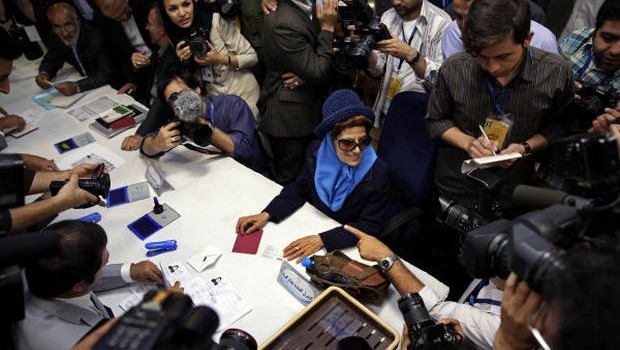
Etrat Kazemi, seated at center, registers her candidacy for the upcoming presidential election, at the election headquarters of the interior ministry in Tehran, Iran, Friday, May 10, 2013. (AP Photo)
The elections are the first since the infamous 2009 elections in which Mahmoud Ahmadinejad was fraudulently reelected to a second presidential term, sparking mass demonstrations—and a brutal government crackdown on protesters—across the country.
So all eyes will be on Iran this June, as the cliché goes—and not just those of Iranians. Diplomats from the P5+1—the five permanent members of the UN Security Council and Germany—will also be watching the elections, hopeful that they will produce a more reasonable nuclear negotiating partner than Ahmadinejad to drive the process forward.
But we have been here before. In early 2005, Western nuclear negotiators were confident that Iran’s presidential elections would see pragmatic former President Akbar Hashemi Rafsanjani return to office. Instead, the election was won convincingly by an international unknown: the hardline former mayor of Tehran, Mahmoud Ahmadinejad. Today, Western diplomats once again look to forthcoming elections to re-calibrate Iran’s domestic politics in their favor.
The hope, though, is more wishful than expectant. For a start, who will run? (Ahmadinejad himself is constitutionally limited to two consecutive terms as president, and thus is barred from seeking a third term.) Mir Hossein Mousavi and Mahdi Karroubi, the leaders of what may loosely be described as the opposition—the so-called Green Movement—have been under house arrest since early 2011, and the many Iranians opposed to the ruling status quo have been brutally suppressed.
Moreover, an election in Iran is a carefully managed affair. Before they can run, all candidates must first be approved by the Guardian Council, who can—and do—strike off the lists those they deem ‘unsuitable’ for the presidency. In practice, this makes it almost impossible for reformers to get through—and those that do, like former President Mohammad Khatami, find themselves stymied and frustrated at every turn once they do gain office. Indeed, Khatami is not likely to seek election this time around, leaving those reformist-minded Iranians with little in the way of choice, short of boycotting the elections completely.
Only a handful of candidates will be on the final list that the Guardian Council unveils later this month, which will overwhelmingly consist of candidates considered loyal to the supreme leader, Ali Khamenei. Given the problems the regime had with opposition figures during the last elections, the supreme leader and his allies will do all they can to ensure there is no repeat of the trouble that, at certain points in the summer of 2009, had many questioning the regime’s ability to survive.
Among the likely favorites are former foreign minister Ali Akbar Velayati, Tehran mayor Mohammad Bagher Qalibaf and former nuclear negotiator Hasan Rouhani—all good regime men, unlikely to cause trouble in any real way.
But, in what is a clear indictment of Ahmadinejad’s time in office—which has seen the economy disintegrate and international isolation increase—all of the main candidates have vowed to make a clear break with the president’s style of leadership. Ahmadinejad is widely blamed for worsening Iran’s situation both domestically and internationally; he is a largely unpopular figure both within the elite and the populace at large. And while all the candidates support Iran’s ‘inalienable’ right to enrich uranium, Ahmadinejad’s nuclear negotiating stance has been attacked by many, including Rafsanjani himself, for bringing down the world’s anger on Iran. The criticisms, however, amount to nuances of diplomatic behavior—all are agreed on the fundamentals that underpin the Islamic Republic.
With all candidates keen to distance themselves from the incumbent as they begin their campaigns before the season has even officially opened, the government is also getting into election mode. The past month has seen a huge increase in controls and blocks on Internet traffic as Tehran attempts to stifle opposition voices during the election period.
Meanwhile, the only liberal-leaning candidate that is likely to be considered by the Guardian Council is former vice president Mohammad Reza Aref, who served in Khatami’s administration. He is largely an unknown, and very unlikely to find any great success at the ballot box; while it is true Ahmadinejad was never expected to win in 2005, he, at least, enjoyed the supreme leader’s approval.
The picture one month before the elections is depressingly familiar: once again, the world watches and waits for some kind of change in Iran. Unfortunately, the result of June’s elections, even if a more reasonable figure than Ahmadinejad is elected (which will not be difficult), is likely to be more of the same.
